Report on Commonwealth Bank's Code of Conduct and Ethical Practices
VerifiedAdded on 2023/06/10
|12
|2874
|240
Report
AI Summary
This report provides a comprehensive overview of the Commonwealth Bank of Australia's (CBA) Code of Conduct. It details the bank's commitment to ethical practices, encompassing key areas such as discrimination, exploitation, corruption, and fraudulent behavior. The report highlights CBA's policies aimed at fostering a respectful and inclusive work environment, preventing labor and sexual exploitation, and combating bribery and corruption through a zero-tolerance approach. Furthermore, it examines the bank's fraud prevention measures and the whistleblower policy designed to encourage reporting of unethical or illegal activities. The code applies to all employees and directors, emphasizing adherence to laws and regulations. The report underscores the importance of these policies in maintaining public trust, ensuring financial well-being, and promoting a culture of integrity and accountability within CBA.
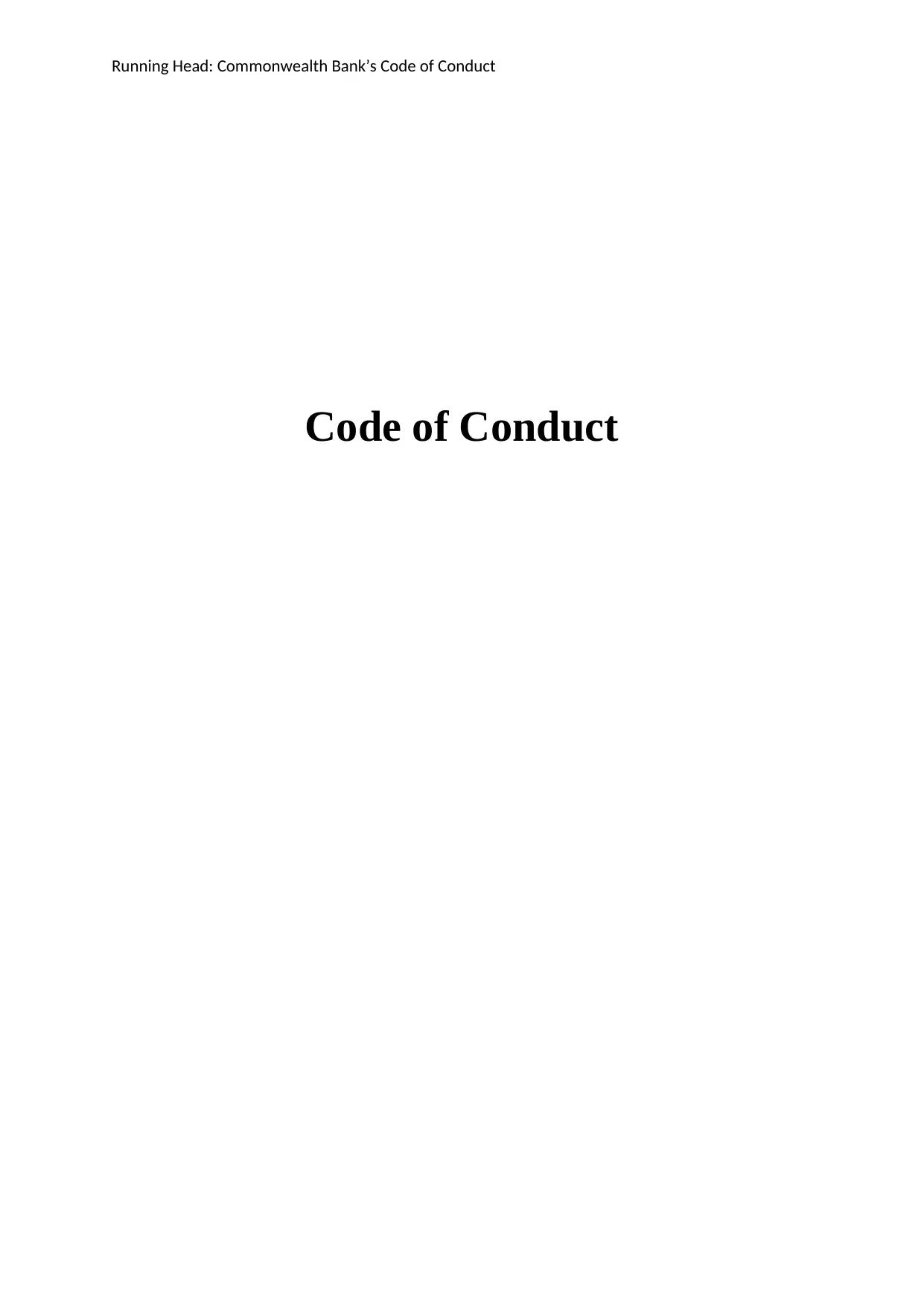
Running Head: Commonwealth Bank’s Code of Conduct
Code of Conduct
Code of Conduct
Paraphrase This Document
Need a fresh take? Get an instant paraphrase of this document with our AI Paraphraser
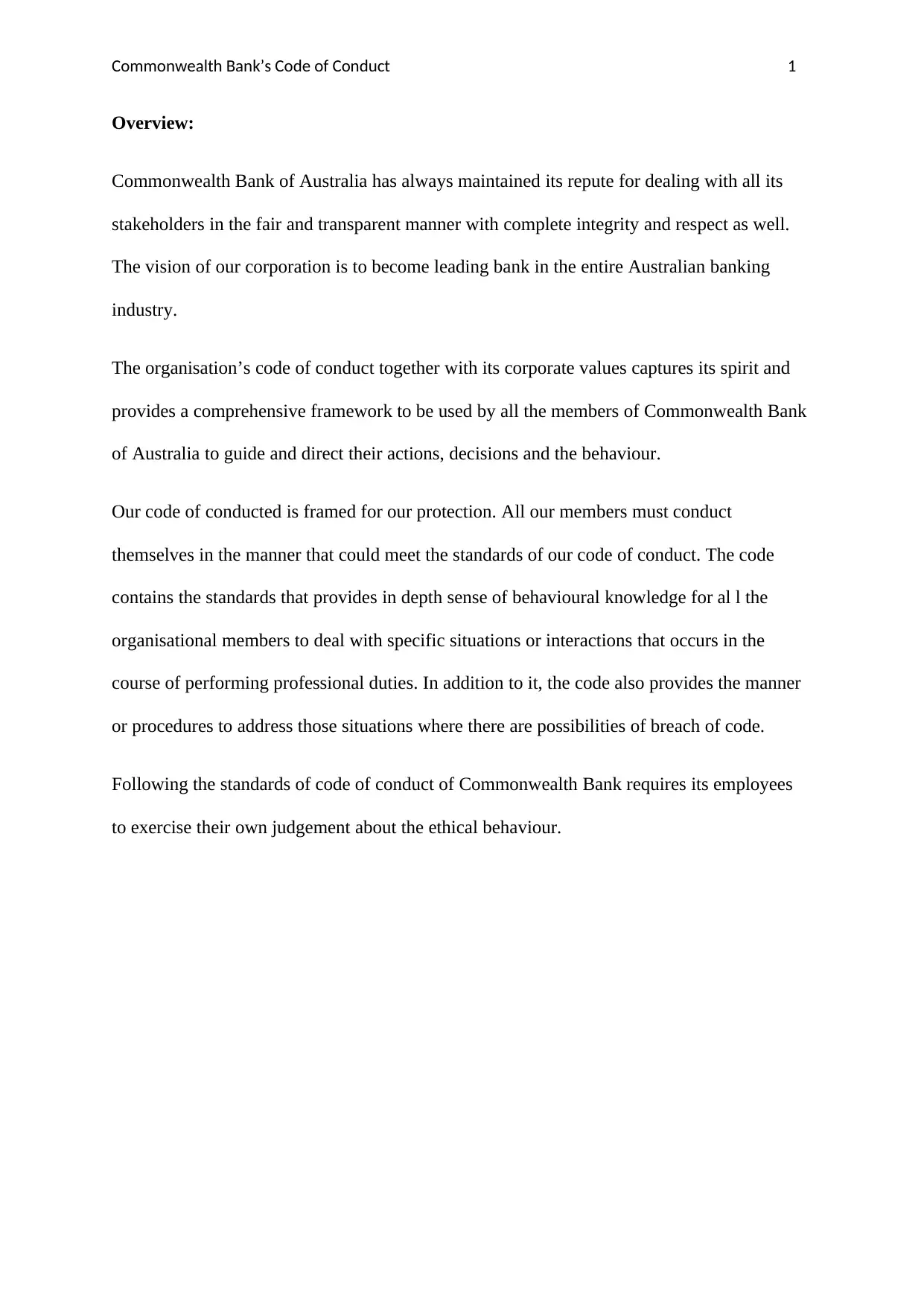
Commonwealth Bank’s Code of Conduct 1
Overview:
Commonwealth Bank of Australia has always maintained its repute for dealing with all its
stakeholders in the fair and transparent manner with complete integrity and respect as well.
The vision of our corporation is to become leading bank in the entire Australian banking
industry.
The organisation’s code of conduct together with its corporate values captures its spirit and
provides a comprehensive framework to be used by all the members of Commonwealth Bank
of Australia to guide and direct their actions, decisions and the behaviour.
Our code of conducted is framed for our protection. All our members must conduct
themselves in the manner that could meet the standards of our code of conduct. The code
contains the standards that provides in depth sense of behavioural knowledge for al l the
organisational members to deal with specific situations or interactions that occurs in the
course of performing professional duties. In addition to it, the code also provides the manner
or procedures to address those situations where there are possibilities of breach of code.
Following the standards of code of conduct of Commonwealth Bank requires its employees
to exercise their own judgement about the ethical behaviour.
Overview:
Commonwealth Bank of Australia has always maintained its repute for dealing with all its
stakeholders in the fair and transparent manner with complete integrity and respect as well.
The vision of our corporation is to become leading bank in the entire Australian banking
industry.
The organisation’s code of conduct together with its corporate values captures its spirit and
provides a comprehensive framework to be used by all the members of Commonwealth Bank
of Australia to guide and direct their actions, decisions and the behaviour.
Our code of conducted is framed for our protection. All our members must conduct
themselves in the manner that could meet the standards of our code of conduct. The code
contains the standards that provides in depth sense of behavioural knowledge for al l the
organisational members to deal with specific situations or interactions that occurs in the
course of performing professional duties. In addition to it, the code also provides the manner
or procedures to address those situations where there are possibilities of breach of code.
Following the standards of code of conduct of Commonwealth Bank requires its employees
to exercise their own judgement about the ethical behaviour.
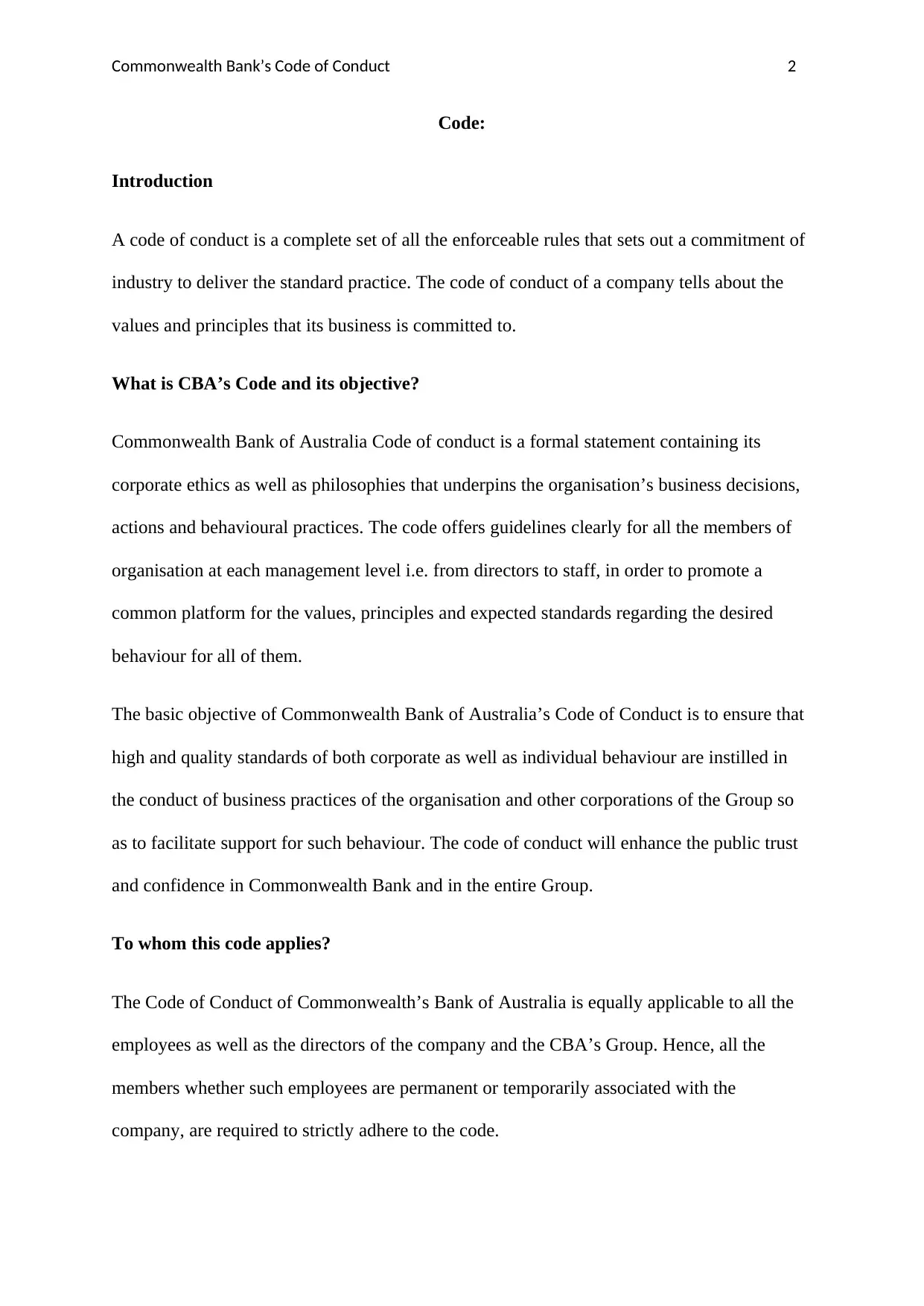
Commonwealth Bank’s Code of Conduct 2
Code:
Introduction
A code of conduct is a complete set of all the enforceable rules that sets out a commitment of
industry to deliver the standard practice. The code of conduct of a company tells about the
values and principles that its business is committed to.
What is CBA’s Code and its objective?
Commonwealth Bank of Australia Code of conduct is a formal statement containing its
corporate ethics as well as philosophies that underpins the organisation’s business decisions,
actions and behavioural practices. The code offers guidelines clearly for all the members of
organisation at each management level i.e. from directors to staff, in order to promote a
common platform for the values, principles and expected standards regarding the desired
behaviour for all of them.
The basic objective of Commonwealth Bank of Australia’s Code of Conduct is to ensure that
high and quality standards of both corporate as well as individual behaviour are instilled in
the conduct of business practices of the organisation and other corporations of the Group so
as to facilitate support for such behaviour. The code of conduct will enhance the public trust
and confidence in Commonwealth Bank and in the entire Group.
To whom this code applies?
The Code of Conduct of Commonwealth’s Bank of Australia is equally applicable to all the
employees as well as the directors of the company and the CBA’s Group. Hence, all the
members whether such employees are permanent or temporarily associated with the
company, are required to strictly adhere to the code.
Code:
Introduction
A code of conduct is a complete set of all the enforceable rules that sets out a commitment of
industry to deliver the standard practice. The code of conduct of a company tells about the
values and principles that its business is committed to.
What is CBA’s Code and its objective?
Commonwealth Bank of Australia Code of conduct is a formal statement containing its
corporate ethics as well as philosophies that underpins the organisation’s business decisions,
actions and behavioural practices. The code offers guidelines clearly for all the members of
organisation at each management level i.e. from directors to staff, in order to promote a
common platform for the values, principles and expected standards regarding the desired
behaviour for all of them.
The basic objective of Commonwealth Bank of Australia’s Code of Conduct is to ensure that
high and quality standards of both corporate as well as individual behaviour are instilled in
the conduct of business practices of the organisation and other corporations of the Group so
as to facilitate support for such behaviour. The code of conduct will enhance the public trust
and confidence in Commonwealth Bank and in the entire Group.
To whom this code applies?
The Code of Conduct of Commonwealth’s Bank of Australia is equally applicable to all the
employees as well as the directors of the company and the CBA’s Group. Hence, all the
members whether such employees are permanent or temporarily associated with the
company, are required to strictly adhere to the code.
⊘ This is a preview!⊘
Do you want full access?
Subscribe today to unlock all pages.

Trusted by 1+ million students worldwide
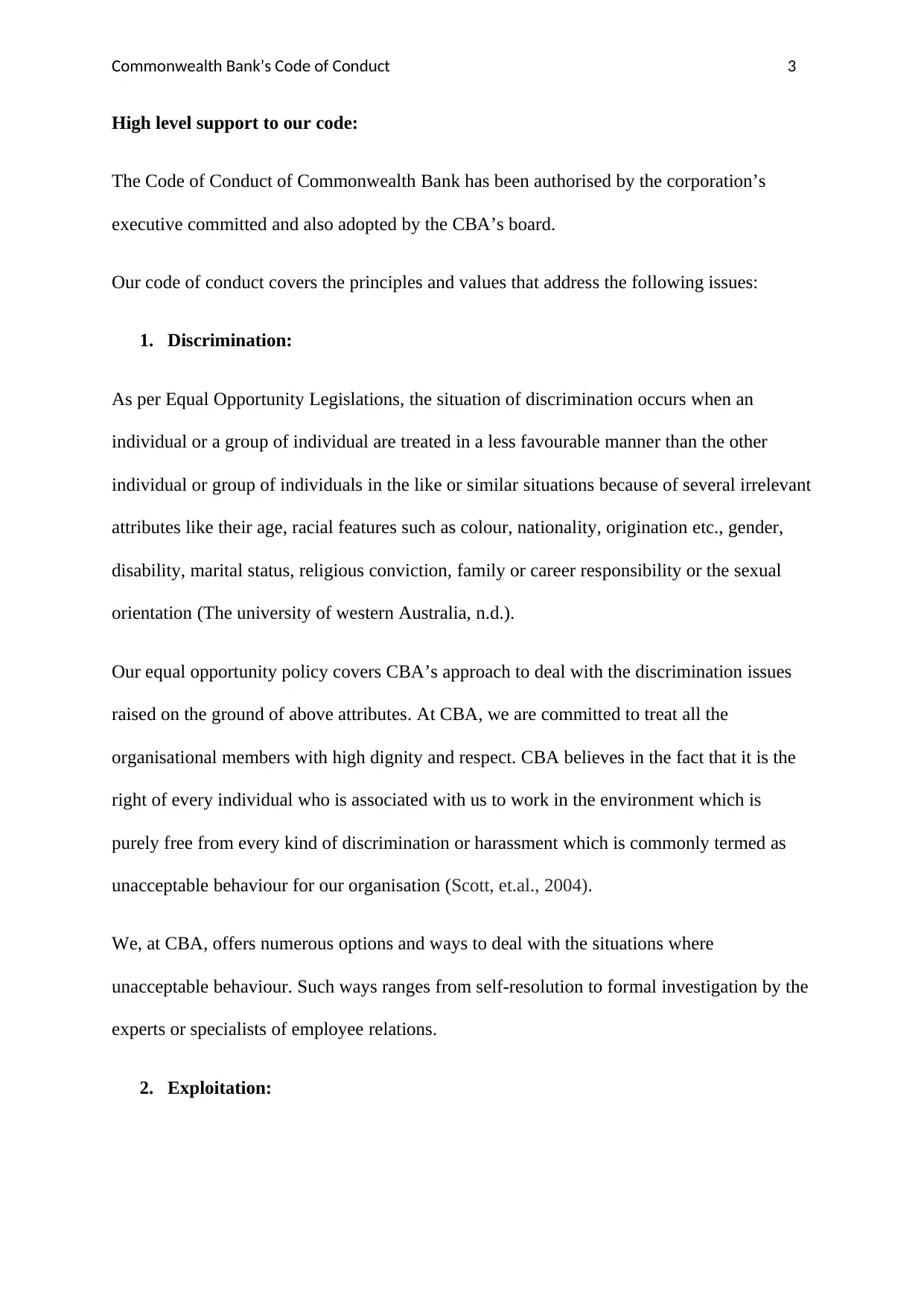
Commonwealth Bank’s Code of Conduct 3
High level support to our code:
The Code of Conduct of Commonwealth Bank has been authorised by the corporation’s
executive committed and also adopted by the CBA’s board.
Our code of conduct covers the principles and values that address the following issues:
1. Discrimination:
As per Equal Opportunity Legislations, the situation of discrimination occurs when an
individual or a group of individual are treated in a less favourable manner than the other
individual or group of individuals in the like or similar situations because of several irrelevant
attributes like their age, racial features such as colour, nationality, origination etc., gender,
disability, marital status, religious conviction, family or career responsibility or the sexual
orientation (The university of western Australia, n.d.).
Our equal opportunity policy covers CBA’s approach to deal with the discrimination issues
raised on the ground of above attributes. At CBA, we are committed to treat all the
organisational members with high dignity and respect. CBA believes in the fact that it is the
right of every individual who is associated with us to work in the environment which is
purely free from every kind of discrimination or harassment which is commonly termed as
unacceptable behaviour for our organisation (Scott, et.al., 2004).
We, at CBA, offers numerous options and ways to deal with the situations where
unacceptable behaviour. Such ways ranges from self-resolution to formal investigation by the
experts or specialists of employee relations.
2. Exploitation:
High level support to our code:
The Code of Conduct of Commonwealth Bank has been authorised by the corporation’s
executive committed and also adopted by the CBA’s board.
Our code of conduct covers the principles and values that address the following issues:
1. Discrimination:
As per Equal Opportunity Legislations, the situation of discrimination occurs when an
individual or a group of individual are treated in a less favourable manner than the other
individual or group of individuals in the like or similar situations because of several irrelevant
attributes like their age, racial features such as colour, nationality, origination etc., gender,
disability, marital status, religious conviction, family or career responsibility or the sexual
orientation (The university of western Australia, n.d.).
Our equal opportunity policy covers CBA’s approach to deal with the discrimination issues
raised on the ground of above attributes. At CBA, we are committed to treat all the
organisational members with high dignity and respect. CBA believes in the fact that it is the
right of every individual who is associated with us to work in the environment which is
purely free from every kind of discrimination or harassment which is commonly termed as
unacceptable behaviour for our organisation (Scott, et.al., 2004).
We, at CBA, offers numerous options and ways to deal with the situations where
unacceptable behaviour. Such ways ranges from self-resolution to formal investigation by the
experts or specialists of employee relations.
2. Exploitation:
Paraphrase This Document
Need a fresh take? Get an instant paraphrase of this document with our AI Paraphraser
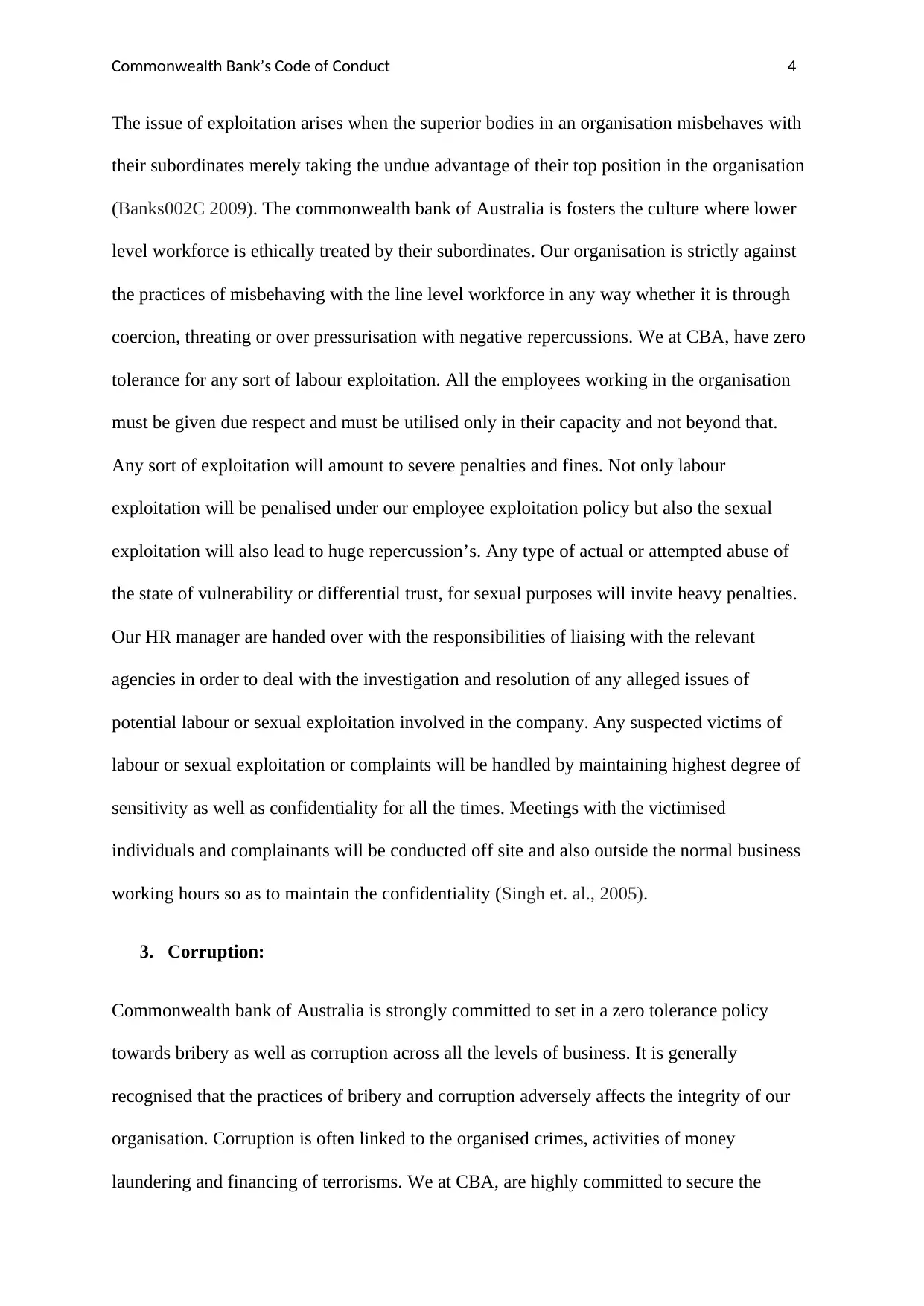
Commonwealth Bank’s Code of Conduct 4
The issue of exploitation arises when the superior bodies in an organisation misbehaves with
their subordinates merely taking the undue advantage of their top position in the organisation
(Banks002C 2009). The commonwealth bank of Australia is fosters the culture where lower
level workforce is ethically treated by their subordinates. Our organisation is strictly against
the practices of misbehaving with the line level workforce in any way whether it is through
coercion, threating or over pressurisation with negative repercussions. We at CBA, have zero
tolerance for any sort of labour exploitation. All the employees working in the organisation
must be given due respect and must be utilised only in their capacity and not beyond that.
Any sort of exploitation will amount to severe penalties and fines. Not only labour
exploitation will be penalised under our employee exploitation policy but also the sexual
exploitation will also lead to huge repercussion’s. Any type of actual or attempted abuse of
the state of vulnerability or differential trust, for sexual purposes will invite heavy penalties.
Our HR manager are handed over with the responsibilities of liaising with the relevant
agencies in order to deal with the investigation and resolution of any alleged issues of
potential labour or sexual exploitation involved in the company. Any suspected victims of
labour or sexual exploitation or complaints will be handled by maintaining highest degree of
sensitivity as well as confidentiality for all the times. Meetings with the victimised
individuals and complainants will be conducted off site and also outside the normal business
working hours so as to maintain the confidentiality (Singh et. al., 2005).
3. Corruption:
Commonwealth bank of Australia is strongly committed to set in a zero tolerance policy
towards bribery as well as corruption across all the levels of business. It is generally
recognised that the practices of bribery and corruption adversely affects the integrity of our
organisation. Corruption is often linked to the organised crimes, activities of money
laundering and financing of terrorisms. We at CBA, are highly committed to secure the
The issue of exploitation arises when the superior bodies in an organisation misbehaves with
their subordinates merely taking the undue advantage of their top position in the organisation
(Banks002C 2009). The commonwealth bank of Australia is fosters the culture where lower
level workforce is ethically treated by their subordinates. Our organisation is strictly against
the practices of misbehaving with the line level workforce in any way whether it is through
coercion, threating or over pressurisation with negative repercussions. We at CBA, have zero
tolerance for any sort of labour exploitation. All the employees working in the organisation
must be given due respect and must be utilised only in their capacity and not beyond that.
Any sort of exploitation will amount to severe penalties and fines. Not only labour
exploitation will be penalised under our employee exploitation policy but also the sexual
exploitation will also lead to huge repercussion’s. Any type of actual or attempted abuse of
the state of vulnerability or differential trust, for sexual purposes will invite heavy penalties.
Our HR manager are handed over with the responsibilities of liaising with the relevant
agencies in order to deal with the investigation and resolution of any alleged issues of
potential labour or sexual exploitation involved in the company. Any suspected victims of
labour or sexual exploitation or complaints will be handled by maintaining highest degree of
sensitivity as well as confidentiality for all the times. Meetings with the victimised
individuals and complainants will be conducted off site and also outside the normal business
working hours so as to maintain the confidentiality (Singh et. al., 2005).
3. Corruption:
Commonwealth bank of Australia is strongly committed to set in a zero tolerance policy
towards bribery as well as corruption across all the levels of business. It is generally
recognised that the practices of bribery and corruption adversely affects the integrity of our
organisation. Corruption is often linked to the organised crimes, activities of money
laundering and financing of terrorisms. We at CBA, are highly committed to secure the
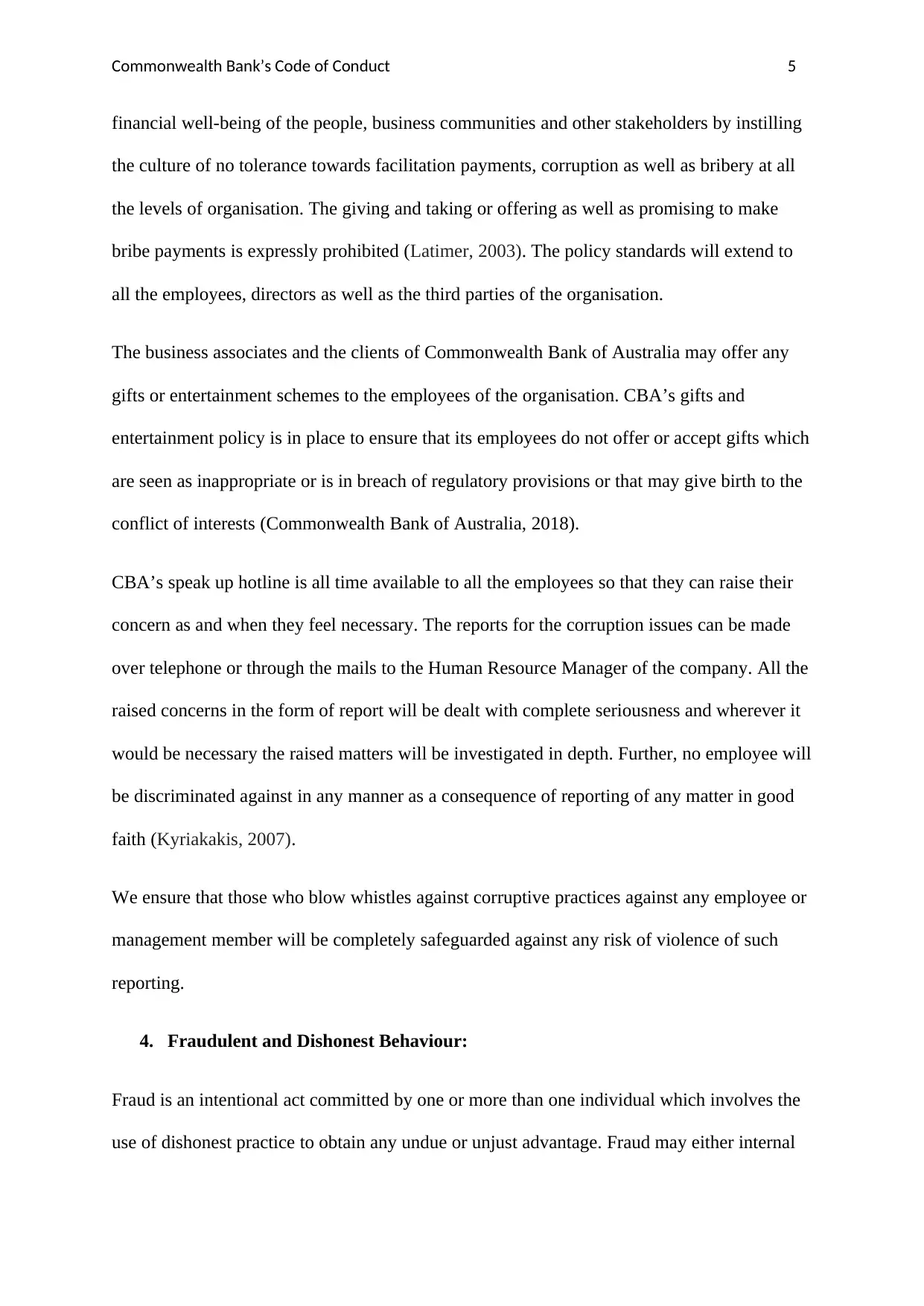
Commonwealth Bank’s Code of Conduct 5
financial well-being of the people, business communities and other stakeholders by instilling
the culture of no tolerance towards facilitation payments, corruption as well as bribery at all
the levels of organisation. The giving and taking or offering as well as promising to make
bribe payments is expressly prohibited (Latimer, 2003). The policy standards will extend to
all the employees, directors as well as the third parties of the organisation.
The business associates and the clients of Commonwealth Bank of Australia may offer any
gifts or entertainment schemes to the employees of the organisation. CBA’s gifts and
entertainment policy is in place to ensure that its employees do not offer or accept gifts which
are seen as inappropriate or is in breach of regulatory provisions or that may give birth to the
conflict of interests (Commonwealth Bank of Australia, 2018).
CBA’s speak up hotline is all time available to all the employees so that they can raise their
concern as and when they feel necessary. The reports for the corruption issues can be made
over telephone or through the mails to the Human Resource Manager of the company. All the
raised concerns in the form of report will be dealt with complete seriousness and wherever it
would be necessary the raised matters will be investigated in depth. Further, no employee will
be discriminated against in any manner as a consequence of reporting of any matter in good
faith (Kyriakakis, 2007).
We ensure that those who blow whistles against corruptive practices against any employee or
management member will be completely safeguarded against any risk of violence of such
reporting.
4. Fraudulent and Dishonest Behaviour:
Fraud is an intentional act committed by one or more than one individual which involves the
use of dishonest practice to obtain any undue or unjust advantage. Fraud may either internal
financial well-being of the people, business communities and other stakeholders by instilling
the culture of no tolerance towards facilitation payments, corruption as well as bribery at all
the levels of organisation. The giving and taking or offering as well as promising to make
bribe payments is expressly prohibited (Latimer, 2003). The policy standards will extend to
all the employees, directors as well as the third parties of the organisation.
The business associates and the clients of Commonwealth Bank of Australia may offer any
gifts or entertainment schemes to the employees of the organisation. CBA’s gifts and
entertainment policy is in place to ensure that its employees do not offer or accept gifts which
are seen as inappropriate or is in breach of regulatory provisions or that may give birth to the
conflict of interests (Commonwealth Bank of Australia, 2018).
CBA’s speak up hotline is all time available to all the employees so that they can raise their
concern as and when they feel necessary. The reports for the corruption issues can be made
over telephone or through the mails to the Human Resource Manager of the company. All the
raised concerns in the form of report will be dealt with complete seriousness and wherever it
would be necessary the raised matters will be investigated in depth. Further, no employee will
be discriminated against in any manner as a consequence of reporting of any matter in good
faith (Kyriakakis, 2007).
We ensure that those who blow whistles against corruptive practices against any employee or
management member will be completely safeguarded against any risk of violence of such
reporting.
4. Fraudulent and Dishonest Behaviour:
Fraud is an intentional act committed by one or more than one individual which involves the
use of dishonest practice to obtain any undue or unjust advantage. Fraud may either internal
⊘ This is a preview!⊘
Do you want full access?
Subscribe today to unlock all pages.

Trusted by 1+ million students worldwide
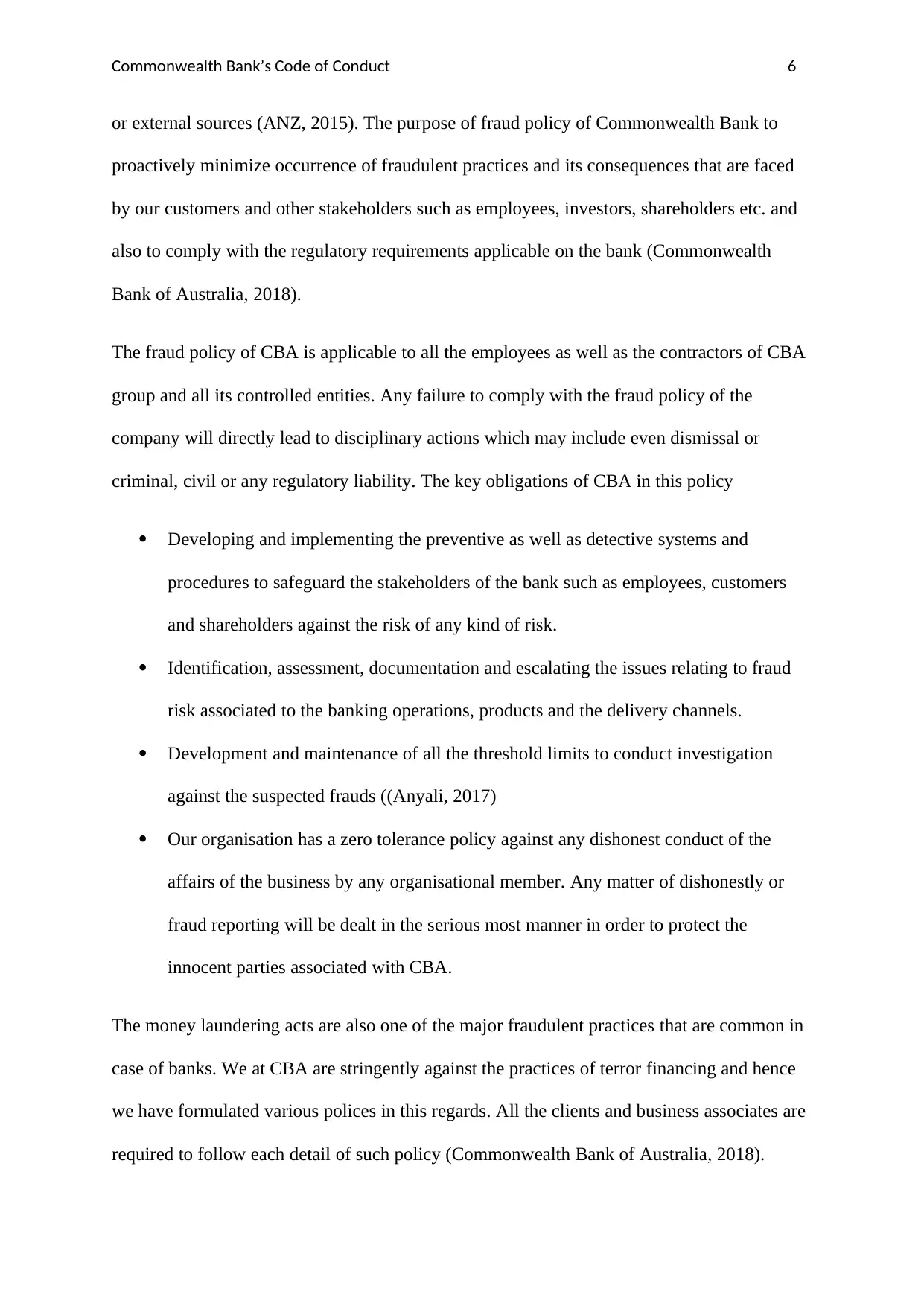
Commonwealth Bank’s Code of Conduct 6
or external sources (ANZ, 2015). The purpose of fraud policy of Commonwealth Bank to
proactively minimize occurrence of fraudulent practices and its consequences that are faced
by our customers and other stakeholders such as employees, investors, shareholders etc. and
also to comply with the regulatory requirements applicable on the bank (Commonwealth
Bank of Australia, 2018).
The fraud policy of CBA is applicable to all the employees as well as the contractors of CBA
group and all its controlled entities. Any failure to comply with the fraud policy of the
company will directly lead to disciplinary actions which may include even dismissal or
criminal, civil or any regulatory liability. The key obligations of CBA in this policy
Developing and implementing the preventive as well as detective systems and
procedures to safeguard the stakeholders of the bank such as employees, customers
and shareholders against the risk of any kind of risk.
Identification, assessment, documentation and escalating the issues relating to fraud
risk associated to the banking operations, products and the delivery channels.
Development and maintenance of all the threshold limits to conduct investigation
against the suspected frauds ((Anyali, 2017)
Our organisation has a zero tolerance policy against any dishonest conduct of the
affairs of the business by any organisational member. Any matter of dishonestly or
fraud reporting will be dealt in the serious most manner in order to protect the
innocent parties associated with CBA.
The money laundering acts are also one of the major fraudulent practices that are common in
case of banks. We at CBA are stringently against the practices of terror financing and hence
we have formulated various polices in this regards. All the clients and business associates are
required to follow each detail of such policy (Commonwealth Bank of Australia, 2018).
or external sources (ANZ, 2015). The purpose of fraud policy of Commonwealth Bank to
proactively minimize occurrence of fraudulent practices and its consequences that are faced
by our customers and other stakeholders such as employees, investors, shareholders etc. and
also to comply with the regulatory requirements applicable on the bank (Commonwealth
Bank of Australia, 2018).
The fraud policy of CBA is applicable to all the employees as well as the contractors of CBA
group and all its controlled entities. Any failure to comply with the fraud policy of the
company will directly lead to disciplinary actions which may include even dismissal or
criminal, civil or any regulatory liability. The key obligations of CBA in this policy
Developing and implementing the preventive as well as detective systems and
procedures to safeguard the stakeholders of the bank such as employees, customers
and shareholders against the risk of any kind of risk.
Identification, assessment, documentation and escalating the issues relating to fraud
risk associated to the banking operations, products and the delivery channels.
Development and maintenance of all the threshold limits to conduct investigation
against the suspected frauds ((Anyali, 2017)
Our organisation has a zero tolerance policy against any dishonest conduct of the
affairs of the business by any organisational member. Any matter of dishonestly or
fraud reporting will be dealt in the serious most manner in order to protect the
innocent parties associated with CBA.
The money laundering acts are also one of the major fraudulent practices that are common in
case of banks. We at CBA are stringently against the practices of terror financing and hence
we have formulated various polices in this regards. All the clients and business associates are
required to follow each detail of such policy (Commonwealth Bank of Australia, 2018).
Paraphrase This Document
Need a fresh take? Get an instant paraphrase of this document with our AI Paraphraser
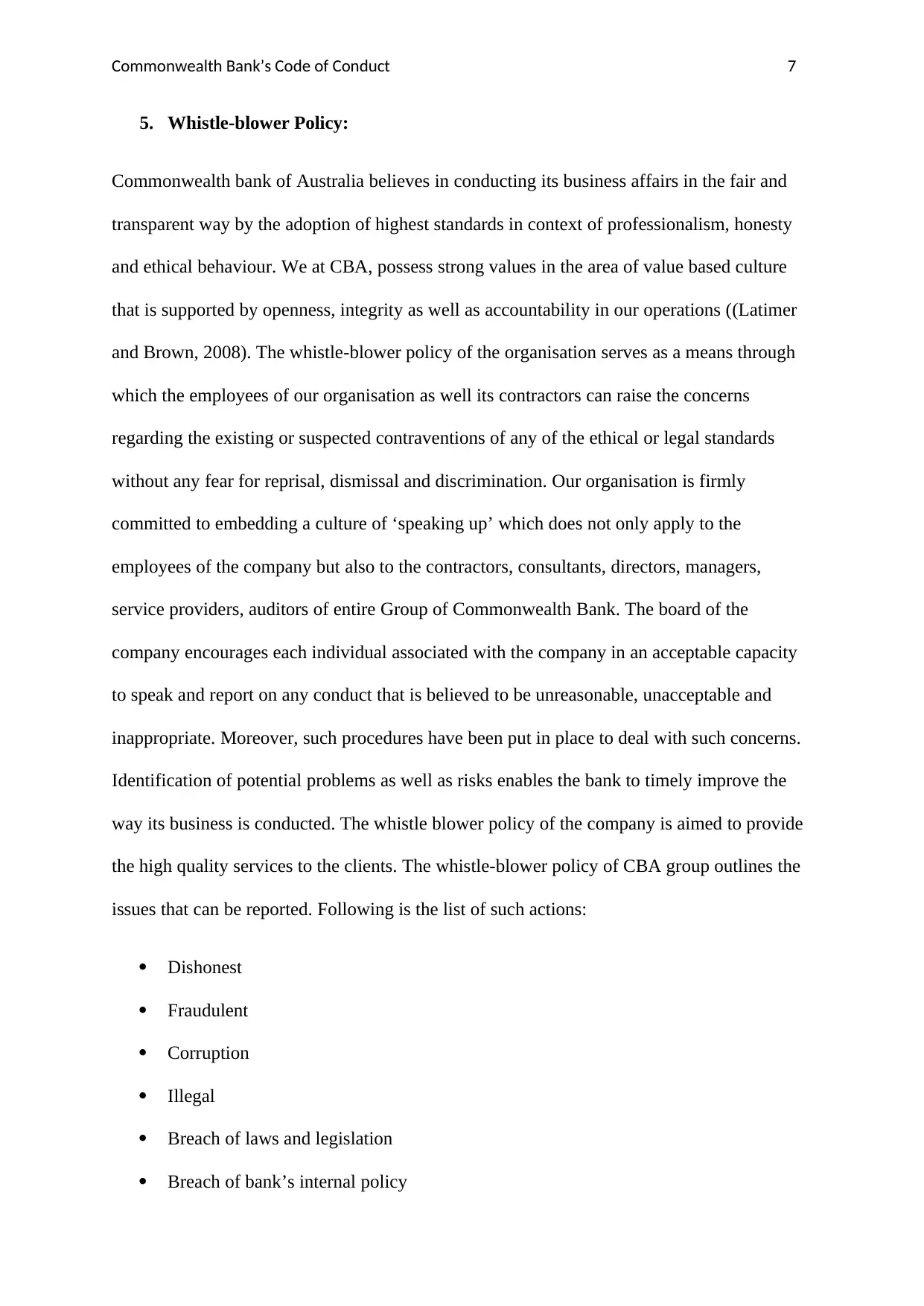
Commonwealth Bank’s Code of Conduct 7
5. Whistle-blower Policy:
Commonwealth bank of Australia believes in conducting its business affairs in the fair and
transparent way by the adoption of highest standards in context of professionalism, honesty
and ethical behaviour. We at CBA, possess strong values in the area of value based culture
that is supported by openness, integrity as well as accountability in our operations ((Latimer
and Brown, 2008). The whistle-blower policy of the organisation serves as a means through
which the employees of our organisation as well its contractors can raise the concerns
regarding the existing or suspected contraventions of any of the ethical or legal standards
without any fear for reprisal, dismissal and discrimination. Our organisation is firmly
committed to embedding a culture of ‘speaking up’ which does not only apply to the
employees of the company but also to the contractors, consultants, directors, managers,
service providers, auditors of entire Group of Commonwealth Bank. The board of the
company encourages each individual associated with the company in an acceptable capacity
to speak and report on any conduct that is believed to be unreasonable, unacceptable and
inappropriate. Moreover, such procedures have been put in place to deal with such concerns.
Identification of potential problems as well as risks enables the bank to timely improve the
way its business is conducted. The whistle blower policy of the company is aimed to provide
the high quality services to the clients. The whistle-blower policy of CBA group outlines the
issues that can be reported. Following is the list of such actions:
Dishonest
Fraudulent
Corruption
Illegal
Breach of laws and legislation
Breach of bank’s internal policy
5. Whistle-blower Policy:
Commonwealth bank of Australia believes in conducting its business affairs in the fair and
transparent way by the adoption of highest standards in context of professionalism, honesty
and ethical behaviour. We at CBA, possess strong values in the area of value based culture
that is supported by openness, integrity as well as accountability in our operations ((Latimer
and Brown, 2008). The whistle-blower policy of the organisation serves as a means through
which the employees of our organisation as well its contractors can raise the concerns
regarding the existing or suspected contraventions of any of the ethical or legal standards
without any fear for reprisal, dismissal and discrimination. Our organisation is firmly
committed to embedding a culture of ‘speaking up’ which does not only apply to the
employees of the company but also to the contractors, consultants, directors, managers,
service providers, auditors of entire Group of Commonwealth Bank. The board of the
company encourages each individual associated with the company in an acceptable capacity
to speak and report on any conduct that is believed to be unreasonable, unacceptable and
inappropriate. Moreover, such procedures have been put in place to deal with such concerns.
Identification of potential problems as well as risks enables the bank to timely improve the
way its business is conducted. The whistle blower policy of the company is aimed to provide
the high quality services to the clients. The whistle-blower policy of CBA group outlines the
issues that can be reported. Following is the list of such actions:
Dishonest
Fraudulent
Corruption
Illegal
Breach of laws and legislation
Breach of bank’s internal policy
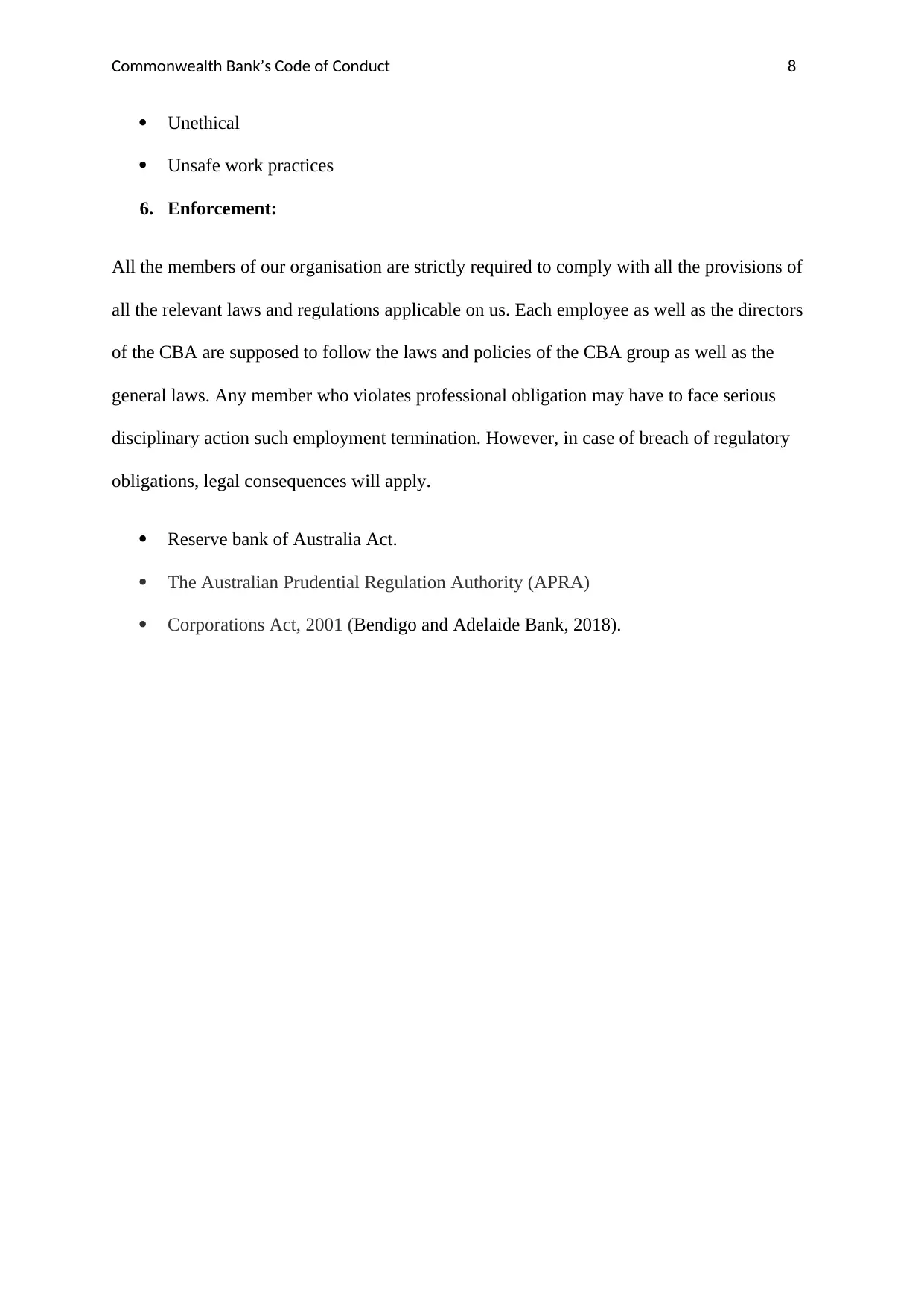
Commonwealth Bank’s Code of Conduct 8
Unethical
Unsafe work practices
6. Enforcement:
All the members of our organisation are strictly required to comply with all the provisions of
all the relevant laws and regulations applicable on us. Each employee as well as the directors
of the CBA are supposed to follow the laws and policies of the CBA group as well as the
general laws. Any member who violates professional obligation may have to face serious
disciplinary action such employment termination. However, in case of breach of regulatory
obligations, legal consequences will apply.
Reserve bank of Australia Act.
The Australian Prudential Regulation Authority (APRA)
Corporations Act, 2001 (Bendigo and Adelaide Bank, 2018).
Unethical
Unsafe work practices
6. Enforcement:
All the members of our organisation are strictly required to comply with all the provisions of
all the relevant laws and regulations applicable on us. Each employee as well as the directors
of the CBA are supposed to follow the laws and policies of the CBA group as well as the
general laws. Any member who violates professional obligation may have to face serious
disciplinary action such employment termination. However, in case of breach of regulatory
obligations, legal consequences will apply.
Reserve bank of Australia Act.
The Australian Prudential Regulation Authority (APRA)
Corporations Act, 2001 (Bendigo and Adelaide Bank, 2018).
⊘ This is a preview!⊘
Do you want full access?
Subscribe today to unlock all pages.

Trusted by 1+ million students worldwide
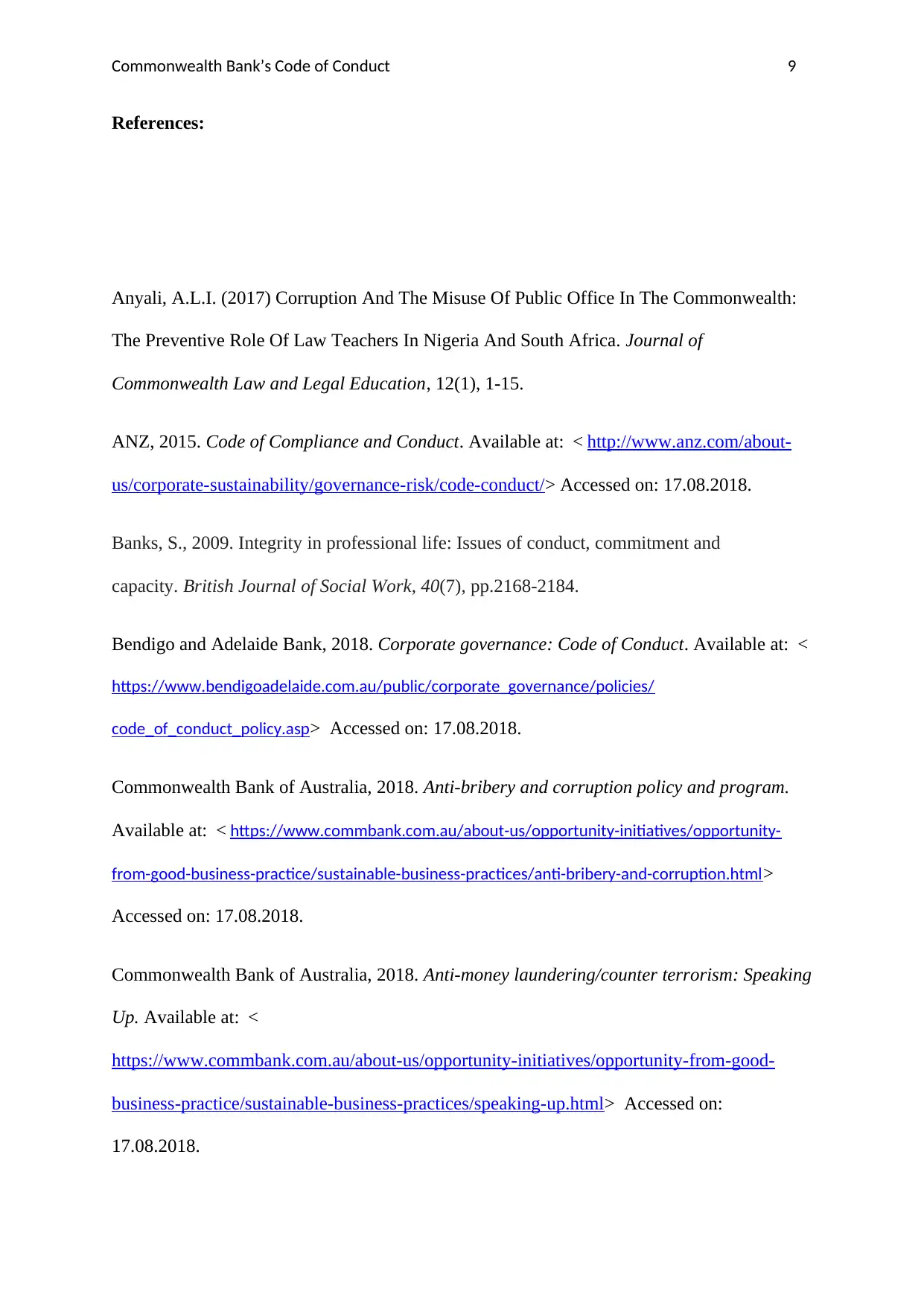
Commonwealth Bank’s Code of Conduct 9
References:
Anyali, A.L.I. (2017) Corruption And The Misuse Of Public Office In The Commonwealth:
The Preventive Role Of Law Teachers In Nigeria And South Africa. Journal of
Commonwealth Law and Legal Education, 12(1), 1-15.
ANZ, 2015. Code of Compliance and Conduct. Available at: < http://www.anz.com/about-
us/corporate-sustainability/governance-risk/code-conduct/> Accessed on: 17.08.2018.
Banks, S., 2009. Integrity in professional life: Issues of conduct, commitment and
capacity. British Journal of Social Work, 40(7), pp.2168-2184.
Bendigo and Adelaide Bank, 2018. Corporate governance: Code of Conduct. Available at: <
https://www.bendigoadelaide.com.au/public/corporate_governance/policies/
code_of_conduct_policy.asp> Accessed on: 17.08.2018.
Commonwealth Bank of Australia, 2018. Anti-bribery and corruption policy and program.
Available at: < https://www.commbank.com.au/about-us/opportunity-initiatives/opportunity-
from-good-business-practice/sustainable-business-practices/anti-bribery-and-corruption.html>
Accessed on: 17.08.2018.
Commonwealth Bank of Australia, 2018. Anti-money laundering/counter terrorism: Speaking
Up. Available at: <
https://www.commbank.com.au/about-us/opportunity-initiatives/opportunity-from-good-
business-practice/sustainable-business-practices/speaking-up.html> Accessed on:
17.08.2018.
References:
Anyali, A.L.I. (2017) Corruption And The Misuse Of Public Office In The Commonwealth:
The Preventive Role Of Law Teachers In Nigeria And South Africa. Journal of
Commonwealth Law and Legal Education, 12(1), 1-15.
ANZ, 2015. Code of Compliance and Conduct. Available at: < http://www.anz.com/about-
us/corporate-sustainability/governance-risk/code-conduct/> Accessed on: 17.08.2018.
Banks, S., 2009. Integrity in professional life: Issues of conduct, commitment and
capacity. British Journal of Social Work, 40(7), pp.2168-2184.
Bendigo and Adelaide Bank, 2018. Corporate governance: Code of Conduct. Available at: <
https://www.bendigoadelaide.com.au/public/corporate_governance/policies/
code_of_conduct_policy.asp> Accessed on: 17.08.2018.
Commonwealth Bank of Australia, 2018. Anti-bribery and corruption policy and program.
Available at: < https://www.commbank.com.au/about-us/opportunity-initiatives/opportunity-
from-good-business-practice/sustainable-business-practices/anti-bribery-and-corruption.html>
Accessed on: 17.08.2018.
Commonwealth Bank of Australia, 2018. Anti-money laundering/counter terrorism: Speaking
Up. Available at: <
https://www.commbank.com.au/about-us/opportunity-initiatives/opportunity-from-good-
business-practice/sustainable-business-practices/speaking-up.html> Accessed on:
17.08.2018.
Paraphrase This Document
Need a fresh take? Get an instant paraphrase of this document with our AI Paraphraser
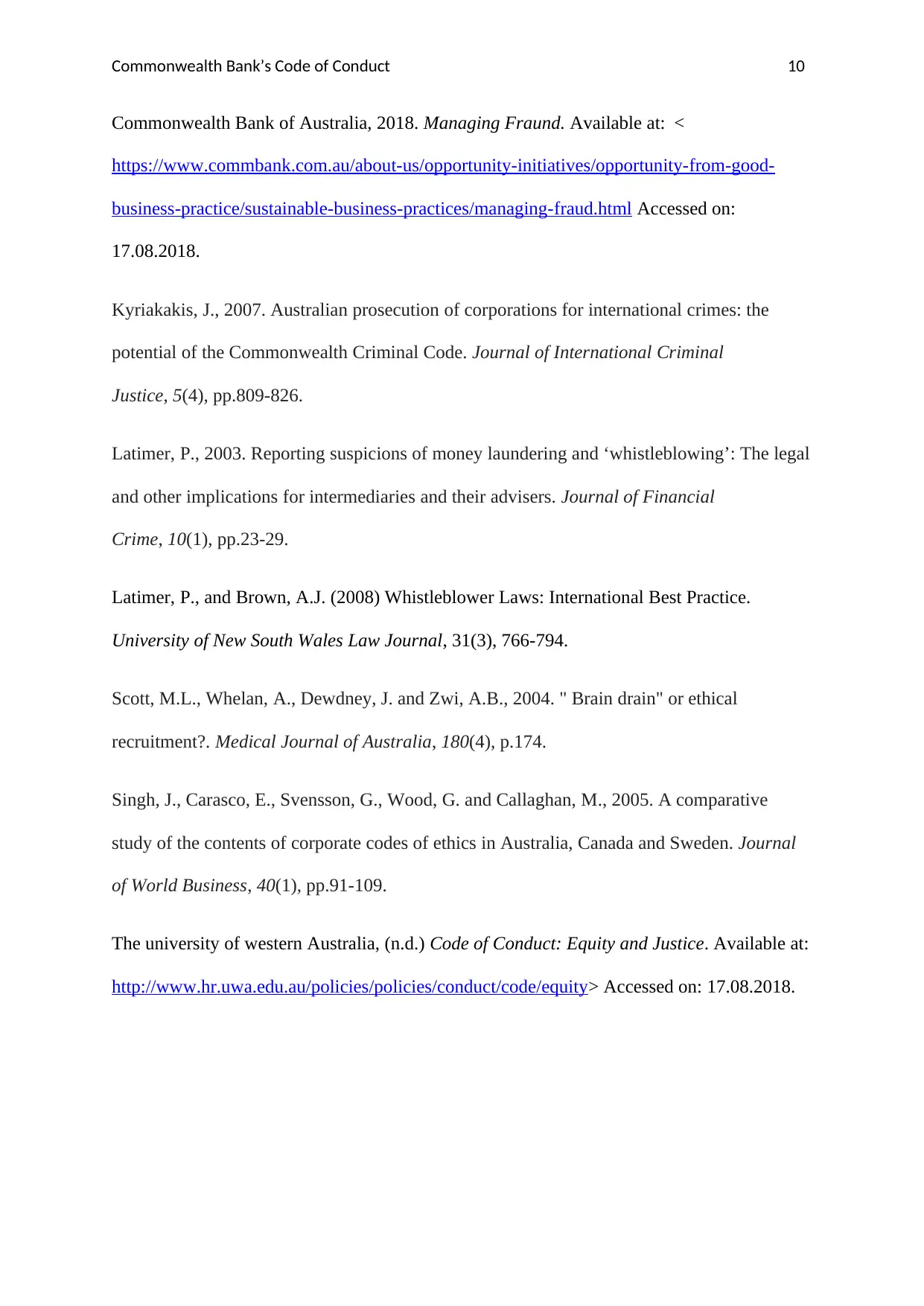
Commonwealth Bank’s Code of Conduct 10
Commonwealth Bank of Australia, 2018. Managing Fraund. Available at: <
https://www.commbank.com.au/about-us/opportunity-initiatives/opportunity-from-good-
business-practice/sustainable-business-practices/managing-fraud.html Accessed on:
17.08.2018.
Kyriakakis, J., 2007. Australian prosecution of corporations for international crimes: the
potential of the Commonwealth Criminal Code. Journal of International Criminal
Justice, 5(4), pp.809-826.
Latimer, P., 2003. Reporting suspicions of money laundering and ‘whistleblowing’: The legal
and other implications for intermediaries and their advisers. Journal of Financial
Crime, 10(1), pp.23-29.
Latimer, P., and Brown, A.J. (2008) Whistleblower Laws: International Best Practice.
University of New South Wales Law Journal, 31(3), 766-794.
Scott, M.L., Whelan, A., Dewdney, J. and Zwi, A.B., 2004. " Brain drain" or ethical
recruitment?. Medical Journal of Australia, 180(4), p.174.
Singh, J., Carasco, E., Svensson, G., Wood, G. and Callaghan, M., 2005. A comparative
study of the contents of corporate codes of ethics in Australia, Canada and Sweden. Journal
of World Business, 40(1), pp.91-109.
The university of western Australia, (n.d.) Code of Conduct: Equity and Justice. Available at:
http://www.hr.uwa.edu.au/policies/policies/conduct/code/equity> Accessed on: 17.08.2018.
Commonwealth Bank of Australia, 2018. Managing Fraund. Available at: <
https://www.commbank.com.au/about-us/opportunity-initiatives/opportunity-from-good-
business-practice/sustainable-business-practices/managing-fraud.html Accessed on:
17.08.2018.
Kyriakakis, J., 2007. Australian prosecution of corporations for international crimes: the
potential of the Commonwealth Criminal Code. Journal of International Criminal
Justice, 5(4), pp.809-826.
Latimer, P., 2003. Reporting suspicions of money laundering and ‘whistleblowing’: The legal
and other implications for intermediaries and their advisers. Journal of Financial
Crime, 10(1), pp.23-29.
Latimer, P., and Brown, A.J. (2008) Whistleblower Laws: International Best Practice.
University of New South Wales Law Journal, 31(3), 766-794.
Scott, M.L., Whelan, A., Dewdney, J. and Zwi, A.B., 2004. " Brain drain" or ethical
recruitment?. Medical Journal of Australia, 180(4), p.174.
Singh, J., Carasco, E., Svensson, G., Wood, G. and Callaghan, M., 2005. A comparative
study of the contents of corporate codes of ethics in Australia, Canada and Sweden. Journal
of World Business, 40(1), pp.91-109.
The university of western Australia, (n.d.) Code of Conduct: Equity and Justice. Available at:
http://www.hr.uwa.edu.au/policies/policies/conduct/code/equity> Accessed on: 17.08.2018.
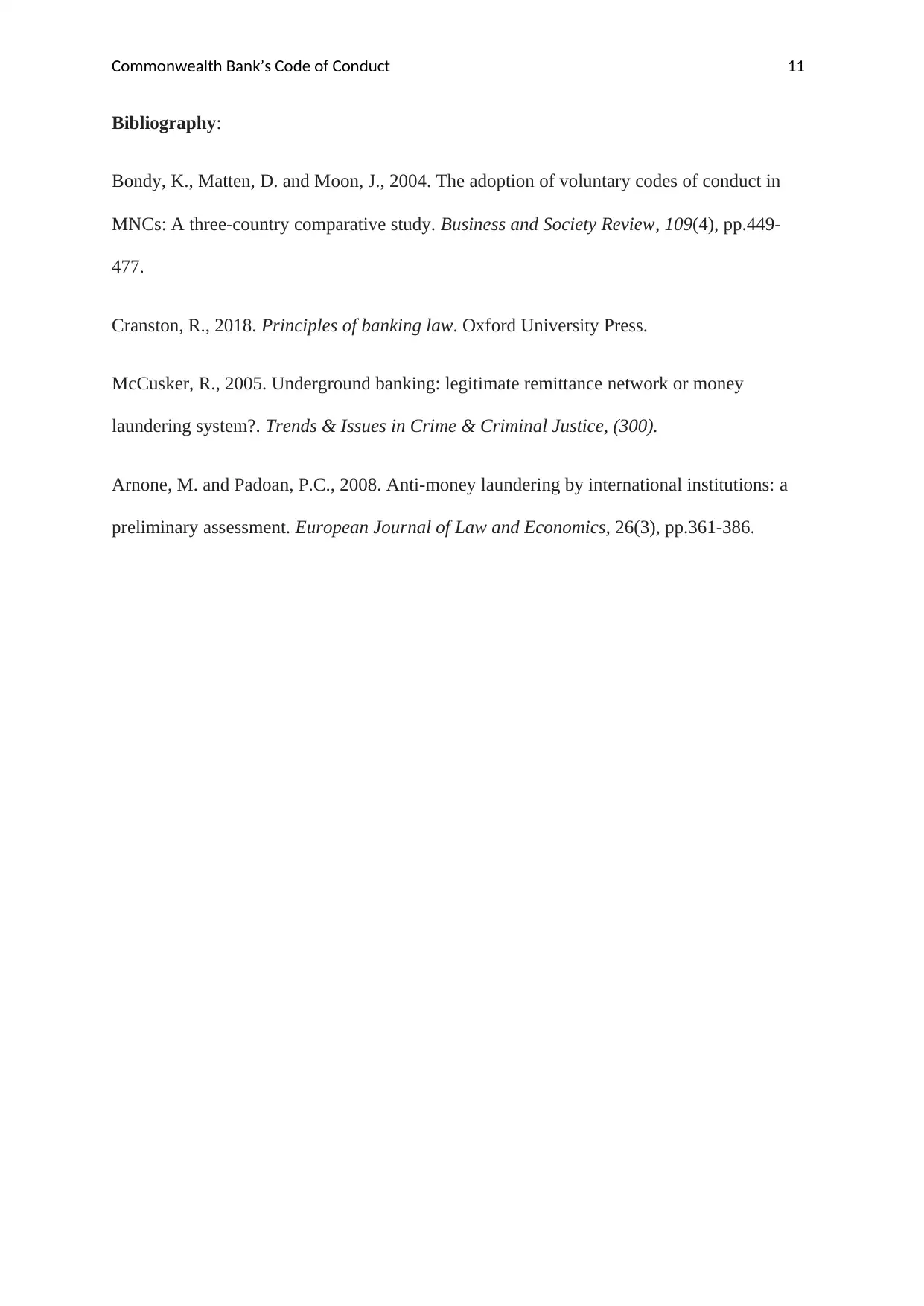
Commonwealth Bank’s Code of Conduct 11
Bibliography:
Bondy, K., Matten, D. and Moon, J., 2004. The adoption of voluntary codes of conduct in
MNCs: A three‐country comparative study. Business and Society Review, 109(4), pp.449-
477.
Cranston, R., 2018. Principles of banking law. Oxford University Press.
McCusker, R., 2005. Underground banking: legitimate remittance network or money
laundering system?. Trends & Issues in Crime & Criminal Justice, (300).
Arnone, M. and Padoan, P.C., 2008. Anti-money laundering by international institutions: a
preliminary assessment. European Journal of Law and Economics, 26(3), pp.361-386.
Bibliography:
Bondy, K., Matten, D. and Moon, J., 2004. The adoption of voluntary codes of conduct in
MNCs: A three‐country comparative study. Business and Society Review, 109(4), pp.449-
477.
Cranston, R., 2018. Principles of banking law. Oxford University Press.
McCusker, R., 2005. Underground banking: legitimate remittance network or money
laundering system?. Trends & Issues in Crime & Criminal Justice, (300).
Arnone, M. and Padoan, P.C., 2008. Anti-money laundering by international institutions: a
preliminary assessment. European Journal of Law and Economics, 26(3), pp.361-386.
⊘ This is a preview!⊘
Do you want full access?
Subscribe today to unlock all pages.

Trusted by 1+ million students worldwide
1 out of 12
Related Documents
Your All-in-One AI-Powered Toolkit for Academic Success.
+13062052269
info@desklib.com
Available 24*7 on WhatsApp / Email
![[object Object]](/_next/static/media/star-bottom.7253800d.svg)
Unlock your academic potential
Copyright © 2020–2026 A2Z Services. All Rights Reserved. Developed and managed by ZUCOL.




